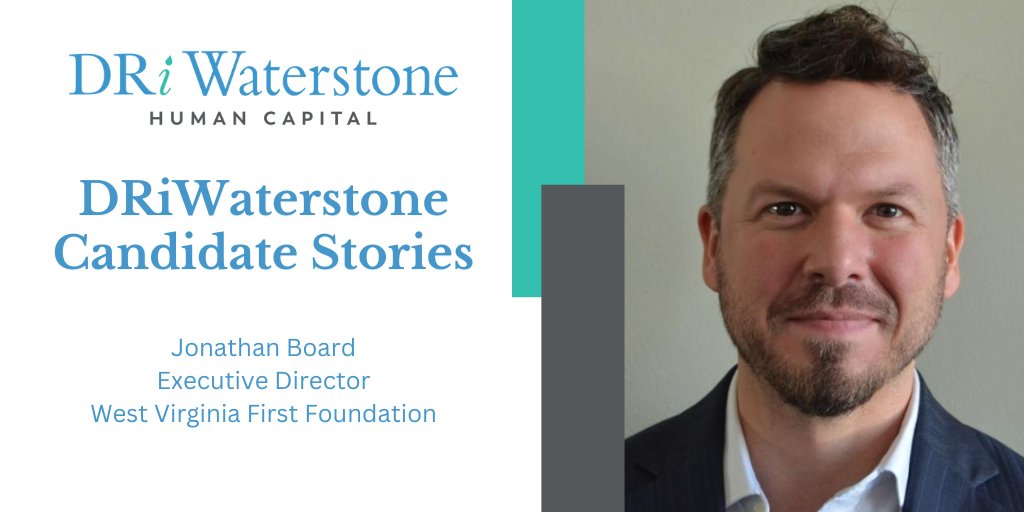On August 22nd, DRiWaterstone (supported by Hunt Scanlon Media) brought together an expert panel to explore some of the critical issues facing nonprofit and social impact organizations including recruitment, retention, and workforce management.
Moderated by our own managing director, Julio Suárez, the session featured Lou DiGioia of the National Association of Theatre Owners, and Catherine Townsend of the Trust for the National Mall, and touched on actionable strategies and firsthand experiences for fostering career development, promoting an inclusive work culture, sustaining a motivated and productive workforce and more.
The case for building diverse, inclusive workplaces has never been stronger. In fact, in its December 2023 report, “Diversity matters even more: The case for holistic impact,” McKinsey & Company found that “the business case for gender diversity on executive teams has more than doubled over the past decade,” and that “companies in the top quartile for both gender and ethnic diversity in executive teams are on average 9 percent more likely to outperform their peers.”
For almost 25 years, the executive search team at DRiWaterstone has been committed to identifying and recruiting diverse professionals for purpose and mission-driven organizations – and the impact of building more diverse, equitable and inclusive workplaces is clear. Here are three tips from our recruitment experts for organizations looking create a positive, more diverse and inclusive workplace:
Make DEI everyone’s responsibility.
What can this look like? Taking the sole responsibility for DEI out of the leadership or HR role and ensuring that everyone on the team understands their role in building a diverse, equitable and inclusive space. Giving team members the opportunity to contribute to DEI efforts by establishing/growing employee resource groups. Building measurements and goals around DEI efforts into the organization’s strategic plans, leadership scorecards, etc.
Strive for unbiased language and tools in your recruiting process.
What can this look like? Developing unbiased job descriptions. Assembling diverse interview panels. Implementing interview scorecards that rate candidates on standardized, pre-determined criteria. Identifying new talent pools using job boards that target diverse communities. Undergoing anti-bias training and implementing anti-bias toolkits for hiring managers/hiring panels.
Focus on building a psychologically safe work environment.
What can this look like? Encouraging team members to show up as their authentic selves. Establishing feedback loops to allow employees to share their experiences and concerns. Developing (and enforcing) DEI policies.
To learn more about how DRiWaterstone can help your organization create a positive, more diverse and inclusive workplace, schedule a call with our team today.

DRiWaterstone Human Capital (DRiWaterstone), a nationally ranked and recognized executive search firm is pleased to welcome Stephanie Fillyaw, as consultant and executive trainer with a focus on DEI workplace strategy.
“Stephanie’s certified, empathy-first approach aligns perfectly with DRiWaterstone’s commitment to providing equal opportunity for employment, participation, and advancement, and to identifying and recruiting diverse professionals in every search,” says Doug Trout, CEO. “It also allows us to support our clients as they look to build more diverse, equitable and inclusive workplaces.”
Fillyaw joining the DRiWaterstone team means that the organization can now facilitate anti-bias training for the interview process, develop bespoke training sessions to meet the DEI development needs of its clients, and much more – in addition to offering best-in-class executive search services for the non-profit and social impact sectors. Services include:
“My job is to help individuals ignite a passion for building commonalities,” says Fillyaw. “Together, we can create solutions that create sustainable change.”
To learn more about how DRiWaterstone can help your organization create a positive, more diverse and inclusive workplace, schedule a call with our team today.

As an executive search firm specializing in the nonprofit and social impact sectors, we have the opportunity to pair our clients with a diverse roster of purpose and mission-driven candidates who want to make an impact on a local, state, national, and global scale.
Earlier this year, DRiWaterstone Human Capital successfully placed Jonathan Board as the inaugural Executive Director at the West Virginia First Foundation. We recently caught up with Jonathan to talk about the Foundation, his role there, and his experience working with our executive search team.
—
DRiWaterstone Human Capital (DRiW): Tell us a little bit about the West Virginia First Foundation.
Jonathan Board (JB): The West Virginia First Foundation was created very uniquely to deal with the public health crisis here in the state of West Virginia, with opioid abuse, misuse, and substance abuse disorders. There’s been over a decade of litigation, and we were formed as sort of repository for monies that are coming in. The legislature, along with the Attorney General and the Governor’s office decided to create a single source to handle those disbursements and to really get involved meaningfully.
It’s a unique creation – you have a publicly created, private foundation that held public elections for its members to disperse tools out into the field for use by boots-on-the-ground experts.
And we’re building this out of the ether. We’re building this using all the traditional notions of a start-up – from infrastructure to building HR to doing all the things that aren’t as newsworthy as policies and procedures and insurances.
But we have a very unique purpose and goal and that’s to heal a state. We understand that we don’t exist, and we don’t have a dollar, but for the fact that people suffered and died. So, there’s a lot of gravity even as we go through some of these traditional, necessary steps.
DRiW: Have there been any highlights or learnings from your time with the Foundation so far?
JB: There’s something special about having such a local connection. This Board is uniquely local, and working with folks with such intimate knowledge of their own communities and the needs there, and of how diverse those needs are as we focus on healing, it’s a wonderful thing. It’s good to have that kind of wisdom that you can lean on.
[We’re] working to heal a certain community as quickly as we can, but with the understanding that we have to get upstream – we have to think generationally. This is something that’s different in this space, because we know we’re at the waterfall’s edge and we want to work with folks and get them back into their communities and back with their families, but we also have to think ahead 20, 30, 40 years from now, understanding that the actions we take now will affect that.
DRiW: Talk a little bit about your experience working with DRiWaterstone and what stood out to you during the hiring process.
JB: Obviously I had some familiarity with the Foundation, not just in its creation, but in its existence. I’d been with them for a few months on the Board when [DRiWaterstone] came alongside.
Again, this foundation was created through legislation to exist privately. But in that legislation, the Attorney General of the state of West Virginia was empowered and required to appoint an Executive Director. When DRiWaterstone came alongside, they got that my negotiations were with the Attorney General, but my bosses would be a Board – some of whom were elected and some of whom weren’t.
I’m sure there were a lot of discussions that I wasn’t familiar with as the team at DRiWaterstone came together and said, ‘All right, here’s how we’re going to compartmentalize this. Here’s how we’re going to articulate this.’
They did a wonderful job. I was always extremely prepared, and it was not only refreshing, but it was also like having a team alongside me in the process.
DRiW: Was there anything unique about DRiWaterstone’s approach that you hadn’t seen in your past experience working with search firms?
JB: I think what was unique here was that team feel – it wasn’t just a cold, corporate touch point from time to time. There was actual engagement, meaningful engagement, between DRiWaterstone and myself on the regular. As a candidate, I had folks reaching out to me independently and saying, ‘Hey, just want to make sure everything’s going well. Are you prepared for this? Is there anything that we can do?’ I felt that was something that set DRiWaterstone above those that I’ve worked with in the past. So, I was very, very pleased.
DRiW: What advice would you have for a candidate who is looking at working with an executive search firm for the first time?
JB: I will say this: find an executive search firm that treats you truly as a client. One that cares about your success – not just checking the box but working on your behalf through the process. That was something that I found very refreshing in this process and something I would imagine would go a long way.
Look for that direct point of contact, where you don’t have 15 different people reaching out all the time. I had (generally speaking) one contact and he was excellent in communicating information. I think we all have fond memories of our favorite restaurant, or wherever we go for service, and there’s always that interaction point, that touch point with wait staff…and there’s that fine balance between checking in on your customer, making sure they have what they need, but also pulling back and giving them space. I think what [DRiWaterstone] did is find that sweet spot and it was just helpful enough and encouraged me to succeed.
DRiW: What’s next for the West Virginia First Foundation?
JB: Because we’re created by law, publicly in legislation, we have certain milestones that we have to reach. We have certain investment goals that we have to reach. We have unique panels, setting up layers of connection to the private communities that we’re supporting. We’ve been moving very quickly because those things had to be in place before we could start meaningfully dispersing monies back out into those communities.
The next step is developing and refining an engagement model so that we can make sure that the right tools are making it to the right folks, and then understanding how they report that and what success looks like. We’re going through that process now, but we are about ready to open the floodgates, and we’re really excited about that.
—
At DRiWaterstone, we have the pleasure to work with some of the best purpose and mission-driven clients and candidates in the nonprofit and social impact space. To learn more about how we can help you build your high-performance teams and drive growth, email us – we’d love to talk!
Julio Suárez, Managing Director
According to the Giving USA 2024: The Annual Report on Philanthropy for the Year 2023, giving by corporations to U.S. charities rose to $36.55 billion in 2023. This accounts for just seven per cent of total giving in the U.S., but it is a growing piece of the pie.
You may be surprised to learn that the teams responsible for running corporate foundation and impact programs are relatively small and, depending on the company, they may also be running multiple other functions, including employee volunteering, sustainability programs, cause marketing campaigns, and DEI programs.
With so many responsibilities and resources at stake, it is critical that companies be highly strategic when recruiting leaders to run these important and highly visible functions. Here are five questions the executive search experts at DRiWaterstone ask when working with corporate foundation and impact clients to assess high-performance leadership candidates:
At DRiWaterstone Human Capital, our team are experts in supporting corporate impact teams and foundations with their recruitment needs. We have hands-on experience running corporate impact programs and foundations, plus more than 20 years in the search business. Schedule a call with our team today and find out how we can help.